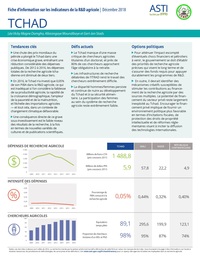Authors:
Léa Vicky Magne Domgho, Allarangaye Moundibaye and Gert-Jan Stads
Year:
2018
Publisher
International Food Policy Research Institute and Institut Tchadien de Recherche Agronomique pour le Développement.
Back to:
Key trends
- A rapid fall in world oil prices has plunged Chad in a severe economic crisis, prompting enormous cuts in public expenditure. Overall, agricultural research spending in Chad fell by two-thirds during 2012–2016.
- In 2016, Chad invested just 0.05 percent of its AgGDP in agricultural R&D, which is extremely low considering the country’s low agricultural productivity, rapid population growth, high levels of poverty and malnutrition, and rising agricultural imports—all in the context of adverse climate change impacts.
- A direct consequence of this severe underinvestment is the low level of research outputs, both in terms of new crop varieties and in publications.
Current challenges
- Chad lacks a critical mass of PhD-qualified agricultural researchers. Moreover, nearly 80 percent of researchers with a PhD are approaching the mandatory retirement age.
- Dilapidated research infrastructure severely hampers ITRAD’s research activities.
- Persisting gender disparity continues to harm Chad’s development and food security. Female representation in the agricultural research system remains extremely weak.
Policy options
- To mitigate the impact of potential financial and oil price shocks in the future, the government needs to clearly identify its long-term agricultural research priorities and secure stable and sustainable funding for R&D programs.
- In addition, the government should explore creative mechanisms to stimulate alternative funding sources. The funding potential of the private sector remains largely untapped in Chad. Cultivating private funding involves providing a more enabling policy environment in terms of tax incentives, protection of intellectual property rights, and regulatory reforms to encourage the spill-in of international technologies.

